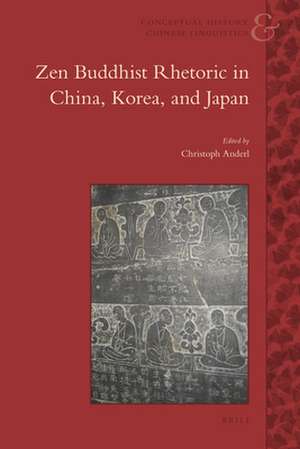Zen Buddhist Rhetoric in China, Korea, and Japan: Conceptual History and Chinese Linguistics, cartea 3
Christoph Anderlen Limba Engleză Hardback – 24 noi 2011
In this volume, leading specialists in East Asian Buddhism and linguistics analyze the interplay of language and doctrine/ideology in Chinese Chán, Korean Sŏn, and Japanese Zen, as well as tracing developments triggered by changes in the respective sociopolitical and socio-religious contexts.
As a special focus, Zen rhetoric will be related to pre-Chán Buddhist literary developments in India and China, in order to trace continuities and changes in the application of rhetorical strategies in the overall framework of Buddhist literary production.
Through this diachronic and comparative approach, the great complexity and the multifaceted features of Chán/Sŏn/Zen literature is revealed.
Preț: 796.17 lei
Preț vechi: 970.95 lei
-18% Nou
Puncte Express: 1194
Preț estimativ în valută:
152.34€ • 159.49$ • 126.06£
152.34€ • 159.49$ • 126.06£
Carte indisponibilă temporar
Doresc să fiu notificat când acest titlu va fi disponibil:
Se trimite...
Preluare comenzi: 021 569.72.76
Specificații
ISBN-13: 9789004185562
ISBN-10: 9004185569
Pagini: 476
Dimensiuni: 160 x 240 x 30 mm
Greutate: 0.92 kg
Editura: Brill
Colecția Brill
Seria Conceptual History and Chinese Linguistics
ISBN-10: 9004185569
Pagini: 476
Dimensiuni: 160 x 240 x 30 mm
Greutate: 0.92 kg
Editura: Brill
Colecția Brill
Seria Conceptual History and Chinese Linguistics
Cuprins
PREFACEIX
CONTRIBUTORSXIII
CHRISTOPH ANDERL: Chán Rhetoric: An Introduction
JENS BRAARVIG: Rhetoric of Emptiness
BART DESSEIN:‘Thus Have I Heard’ and Other Claims to Authenticity: Development of Rhetorical Devices in the Sarvāstivāda Ṣaṭpādābhidharma Text
CHRISTOPH HARBSMEIER: Reading the One Hundred Parables Sūtra: The Dialogue Preface and the Gāthā Postface
CHRISTOPH ANDERL: Coming to Terms with Terms: The Rhetorical Function of Technical Terms in Chán Buddhist Texts
HALVOR EIFRING: Beyond Perfection: The Rhetoric of Chán Poetry in Wáng Wéi’s Wǎng Stream Collection
CHRISTIAN WITTERN: Some Preliminary Remarks to a Study of Rhetorical Devices in Chán Yǔlù 禪語錄 Encounter Dialogues
WILLIAM M. BODIFORD: The Rhetoric of Chinese Language in Japanese Zen
STEVEN HEINE: Dōgen’s Appropriation of Chinese Chán Sources: Sectarian and Non-Sectarian Rhetorical Perspectives
ROBERT BUSWELL: Pojo Chinul 普照知訥 and Kanhwa Sǒn 看話禪: Reconciling the Language of Moderate and Radical Subitism
JÖRG PLASSEN: From Apologetics to Subversion: Some Initial Observations on Sŏlcham’s 雪岑 Chodong owi yohae 曹洞五位要解
JONGMYUNG KIM: Hyujŏng’s Sŏn’ga kwigam and its Historical Setting and Soteriological Strategies
VLADIMIR TIKHONOV: Manhae Han Yongun’s Attempt at Producing an All-Inclusive Modern Buddhist Compendium – Pulgyo Taejŏn
THERESE SOLLIEN: Sermons by Xū Yún – A Special Transmission Within the Scriptures
INDEX
CONTRIBUTORSXIII
CHRISTOPH ANDERL: Chán Rhetoric: An Introduction
JENS BRAARVIG: Rhetoric of Emptiness
BART DESSEIN:‘Thus Have I Heard’ and Other Claims to Authenticity: Development of Rhetorical Devices in the Sarvāstivāda Ṣaṭpādābhidharma Text
CHRISTOPH HARBSMEIER: Reading the One Hundred Parables Sūtra: The Dialogue Preface and the Gāthā Postface
CHRISTOPH ANDERL: Coming to Terms with Terms: The Rhetorical Function of Technical Terms in Chán Buddhist Texts
HALVOR EIFRING: Beyond Perfection: The Rhetoric of Chán Poetry in Wáng Wéi’s Wǎng Stream Collection
CHRISTIAN WITTERN: Some Preliminary Remarks to a Study of Rhetorical Devices in Chán Yǔlù 禪語錄 Encounter Dialogues
WILLIAM M. BODIFORD: The Rhetoric of Chinese Language in Japanese Zen
STEVEN HEINE: Dōgen’s Appropriation of Chinese Chán Sources: Sectarian and Non-Sectarian Rhetorical Perspectives
ROBERT BUSWELL: Pojo Chinul 普照知訥 and Kanhwa Sǒn 看話禪: Reconciling the Language of Moderate and Radical Subitism
JÖRG PLASSEN: From Apologetics to Subversion: Some Initial Observations on Sŏlcham’s 雪岑 Chodong owi yohae 曹洞五位要解
JONGMYUNG KIM: Hyujŏng’s Sŏn’ga kwigam and its Historical Setting and Soteriological Strategies
VLADIMIR TIKHONOV: Manhae Han Yongun’s Attempt at Producing an All-Inclusive Modern Buddhist Compendium – Pulgyo Taejŏn
THERESE SOLLIEN: Sermons by Xū Yún – A Special Transmission Within the Scriptures
INDEX
Notă biografică
Christoph Anderl, Dr. Art. (2004), is currently participating in a project (Ruhr University Bochum) on the spread of Buddhist narratives and iconography along the Silk Road, as well as being Guest Professor of East Asian Linguistics at Ghent University. His publications focus on issues concerning medieval Chinese language and Buddhism, including his two-volumed Studies in the Language of Zǔtáng jí (Oslo, Unipub 2004).
Recenzii
'This book of collected essays is definitely a welcome volume for scholars of Chan studies.(...) Through this diachronic and comparative approach, the work aims to illustrate the great complexity and the multifaceted features of Chan literature in the respective socio-political and socio-religious contexts.(...) the rhetorical approach applied in this volume and the undeniable merits it brings to the field of Chan/Son/Zen should be regarded highly.'
Lin Pei-ying, The Eastern Buddhist, 43 (1&2: 2012)
'...a welcome edition to Zen Studies.'
Jimmy Yu, Religious Studies Review, September 2014.
Lin Pei-ying, The Eastern Buddhist, 43 (1&2: 2012)
'...a welcome edition to Zen Studies.'
Jimmy Yu, Religious Studies Review, September 2014.


